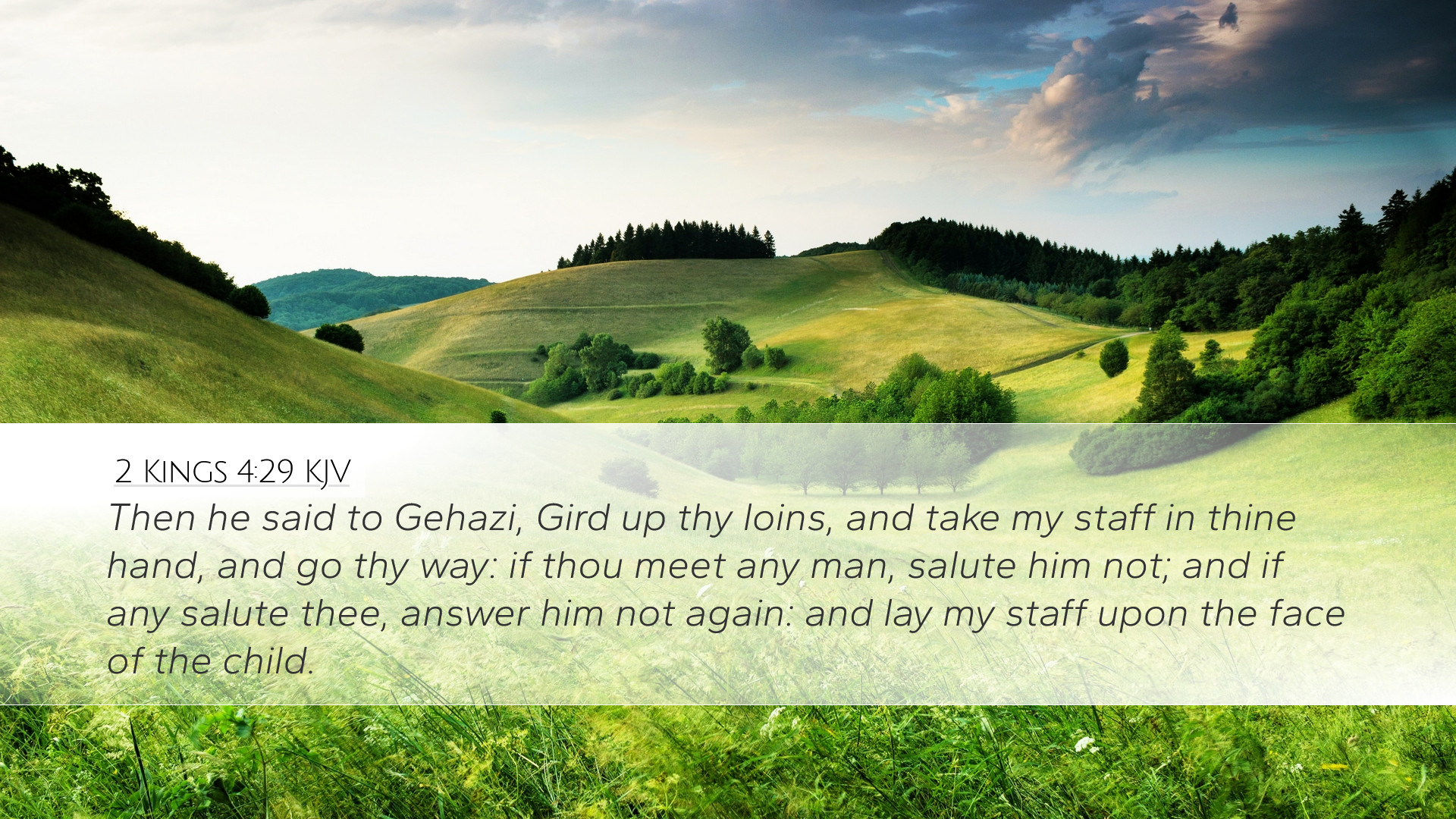Commentary on 2 Kings 4:29
2 Kings 4:29 states: "Then he said to Gehazi, 'Gird up your loins and take my staff in your hand, and go your way: if you meet any man, salute him not; and if any man salute you, answer him not again: and lay my staff upon the face of the child.'"
Introduction
This verse captures a critical moment during Elisha's ministry, as he commands his servant Gehazi to deliver his staff to the Shunammite woman's deceased son. It reveals the urgency of the situation and the seriousness with which Elisha approaches the miraculous acts of God. To gain a comprehensive understanding, we examine insights from various public domain commentaries.
Contextual Background
In preceding verses, the backdrop of this event unfolds with the Shunammite woman experiencing profound grief due to the death of her son. Elisha had performed a miracle by granting her a child, and now, the loss prompts a desperate response: she seeks Elisha's help, indicating her faith in the prophet's ministry.
Exegesis of 2 Kings 4:29
The instruction given by Elisha to Gehazi indicates a few important themes:
- Gird Up Your Loins: This phrase symbolizes readiness and preparation for action. Elisha's urgency indicates the critical nature of the situation he is addressing.
- The Staff as a Symbol: The staff represents Elisha's authority and God's power operating through him. By sending his staff, he entrusts Gehazi with a symbol of miraculous potential.
- Instructions to Gehazi: The explicit directions to ignore any greetings underscore the importance of focus and urgency in ministry, reminding us that distractions can detract from essential tasks.
Insights from Matthew Henry
Matthew Henry emphasizes the significance of the commands given to Gehazi. He notes that Elisha's instructions demonstrate a clear understanding of the task's seriousness and urgency. Gehazi's role as a servant signifies humility and the need for obedience as vital traits in a minister's life. The directive to rush and not to delay with conversations demonstrates the seriousness of the ministry Elisha is engaged in.
Insights from Albert Barnes
Albert Barnes offers insights into the practical implications of the command. He notes that the staff was not inherently powerful but served as a point of contact with God's power. Barnes elaborates on the fact that Gehazi was entrusted with a significant responsibility; despite this, he also warns of the potential human failures in ministry, as Gehazi later faltered in understanding the power behind the staff.
Insights from Adam Clarke
Adam Clarke provides a scholarly analysis of Elisha's instructions, suggesting they illustrate a prophetic demonstration of faith. Clarke emphasizes the very act of sending Gehazi with the staff as a theological confirmation of God's presence and capability to perform miracles, even from a distance. He also addresses the themes of faith and obedience, noting how Gehazi's actions reflect on the broader message of service in the prophetic ministry.
Theological Reflection
Several theological implications arise from the examination of 2 Kings 4:29:
- Faith in Action: This verse reminds pastoral leaders to act swiftly in times of crisis, embodying a faith compelled to seek God's intervention.
- Servanthood and Responsibility: Gehazi's role highlights the importance of servants in the ministry. Faithful service requires not just readiness but also understanding the weight of the tasks given to them.
- Miraculous Expectations: The act of laying the staff upon the child symbolizes faith in the miraculous. It points to the belief that God can intervene in seemingly hopeless situations, calling believers to maintain hope and expectation in God's power.
Application for Pastors and Theologians
For pastors and theologians, this verse commands reflection on several points:
- Urgency in Ministry: Like Elisha, church leaders must remain vigilant to promptly address the needs of their congregation.
- Empowerment of Servants: Just as Elisha empowered Gehazi, leaders are called to empower their followers for effective ministry, trusting in God's provision and guidance.
- Challenges of Human Nature: The subsequent actions of Gehazi serve as a warning about the potential pitfalls of ministers, encouraging introspection and the pursuit of spiritual maturity.
Conclusion
In conclusion, 2 Kings 4:29 serves as a pivotal moment in Elisha's ministry, inviting us to consider our readiness for action, the importance of relationships in ministry, and the necessity of placing our faith in God's miraculous capabilities. By engaging with the insights from public domain commentaries, we gain a richer understanding of the theological and practical implicationsechoing across time to guide the lives of ministers and believers today.


